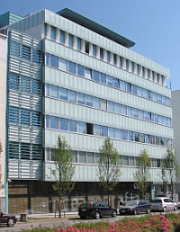Principal functions
We provide maintenance and supply of living cultures of Baltic and freshwater algae from Poland. We also conduct research and environmental applications, provide educational materials, and operate an algal depository.
General information

The CCBA algae collection was established in the mid-1980s by Dr Adam Latała at the Laboratory of Marine Plant Ecology (PERM) at the University of Gdańsk. It currently has university status and is located at the Faculty of Oceanography and Geography at the same institution. The university covers all personnel costs and provides spaces for cultivation and laboratories. The CCBA collection contains cyanobacteria and microalgae strains from the Baltic Sea, as well as a smaller number of relevant strains from freshwater or marine environments. The cultures are unialgal and mostly non-axenic. In January 2008, the CCBA collection was registered under number 914 (ccinfo.wdcm.org/details) and included in the World Federation for Culture Collection (WFCC), whose database contains approximately 870 collections of microorganisms from around 80 countries worldwide (wfcc.info/database). The collection is constantly expanding with new isolated strains. Some strains are available for distribution, while others are still being described or studied. After the relevant approvals have been obtained, selected strains are available free of charge for research and educational purposes. They can also be purchased by commercial enterprises. We do not distribute strains from other collections. All strains are labelled with a CCBA catalogue number. Please quote this number in publications or when ordering strains from the collection. The collection manager can provide full information on the strains and cultures (availability, ordering, delivery, etc.).
Laboratories equipped with the necessary tools for cultivating algae in controlled environments can facilitate experimental research on subjects such as the ecophysiology, taxonomy, ecotoxicology and phylogenesis of algae.
Specification
 The CCBA collection includes strains that we have isolated ourselves, as well as those obtained from other culture collections. We currently have approximately 100 original strains of cyanobacteria and Baltic algae, as well as 100 strains obtained from other collections. The CCBA collection's laboratory resources include three thermostatically controlled rooms with temperature control ranging from 10°C to 30°C and light/dark cycles. Gases for aeration of cultures are available for a wide range of applications. We also have eight smaller incubators with light/dark cycles that can maintain a constant temperature in the range of 5°C to 40°C with an accuracy of ±1°C and adjustable light intensity. The laminar flow cabinet is used for aseptic work with strains. The CCBA collection also includes a various other pieces of laboratory equipment, such as an autoclave, a laboratory glassware washer, refrigerators, a laboratory fume hood, light microscopes (LM), a high-performance liquid chromatography (HPLC) system, an atomic absorption spectrophotometer (AA), Coulter counter, laboratory scales, sonicator, water purification equipment, a micro-respirometer, flow cytometer, a PAM fluorometer, as well as laboratory photobioreactors.
The CCBA collection includes strains that we have isolated ourselves, as well as those obtained from other culture collections. We currently have approximately 100 original strains of cyanobacteria and Baltic algae, as well as 100 strains obtained from other collections. The CCBA collection's laboratory resources include three thermostatically controlled rooms with temperature control ranging from 10°C to 30°C and light/dark cycles. Gases for aeration of cultures are available for a wide range of applications. We also have eight smaller incubators with light/dark cycles that can maintain a constant temperature in the range of 5°C to 40°C with an accuracy of ±1°C and adjustable light intensity. The laminar flow cabinet is used for aseptic work with strains. The CCBA collection also includes a various other pieces of laboratory equipment, such as an autoclave, a laboratory glassware washer, refrigerators, a laboratory fume hood, light microscopes (LM), a high-performance liquid chromatography (HPLC) system, an atomic absorption spectrophotometer (AA), Coulter counter, laboratory scales, sonicator, water purification equipment, a micro-respirometer, flow cytometer, a PAM fluorometer, as well as laboratory photobioreactors.
Skills
- Isolation and culture of microalgae strains
- Bacteria-free culture techniques
- Growth optimisation and ecophysiological characteristic of algae
- Measurements of biomass production, photosynthesis and respiration
CCBA Content
- The collection now contains tens of original strains that were isolated from the coastal waters of the southern Baltic
- The strains include cyanobacteria, green algae, diatoms and microflagellates
- The strains exhibit characteristics of marine, brackish and freshwater environments
Objectives
- Creation of the first and modern algal culture collection in Poland
- Isolation of new strains from Baltic Sea and Polish inland waters, with special attention paid to species that are threatened with extinction, rare, harmful or endemic to the Polish region
- Extending knowledge of algal biodiversity
- Preservation of the region's microbiological and biological resources
- Utilization of strains from the collection for research, educational, industrial and commercial purposes
- Investigating of different environmental factors to determine optimal conditions for algal growth
- Exploitation of the Baltic strains in ecophysiological and ecotoxicological studies
